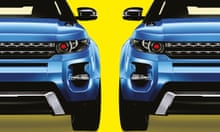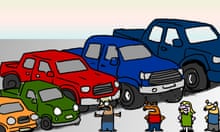Tesla’s Cybertruck is too big and sharp for European roads, transport campaigners have warned, as questions are raised about the registration of one of the first of the electric pickup trucks to hit the continent.
There had been confusion about whether the Cybertruck could be driven in Europe, owing to strict road safety rules that ban sharp edges and require speed limiters on vehicles that weigh more than 3.5 tonnes when full. Tesla’s manual lists the angular steel vehicle as having a gross vehicle weight of 4 tonnes. (The equivalent of a standard family car, such as a Ford Focus, is 1.9 tonnes.)
A handful of Cybertrucks have already been spotted on European streets this year, causing safety fears among campaigners. In a letter to the European Commission and to authorities in the Czech Republic, where the registration of one Cybertruck has raised questions about the rules, campaign groups called for Cybertrucks registered in the EU to be removed from public roads.
“Very oversized pickup trucks [are] now being increasingly imported and bringing danger to our streets,” said James Nix of the nonprofit Transport & Environment, which co-signed the letter.
Europe’s car market has followed the North American shift to big and heavy sports utility vehicles, but safety and pollution regulations have stunted the growth of the most dangerous pickup trucks.
Despite this, tens of thousands of the biggest vehicles have flooded the continent through a back-door channel. Imported cars can be registered through an “individual vehicle approval” that subjects them to less scrutiny than the “type approvals” that most cars undergo. Approval authorities in member states, which are responsible for checking vehicles before they reach the market, have some room to deviate from EU rules in individual cases if they impose alternative requirements.
The different approval routes have raised questions about whether Cybertrucks in Europe have been registered correctly, or through a legally sound loophole.
In July, a Cybertruck with an unladen weight of 3.025 tonnes was registered in the Czech Republic. It had been modified to comply with lighting rules and to protect road users from its sharp edges, but the vehicle appears to still fall foul of weight restrictions. If it were to hold four passengers who were slightly heavier than the average European man, or carry cargo such as furniture or other heavy goods, it would weigh more than 3.5 tonnes – the threshold for vehicles that need a speed limiter.
The Czech transport ministry said all vehicles in the N1 category, in which the truck was registered, have weight ratios calculated from formulas in EU regulation from 2018. But the vehicle data it provided shows the Cybertruck does not satisfy the formulas when carrying four passengers.
TÜV Nord, the company that provided the technical data for the truck’s approval, did not respond to a request for comment.
Norton Slovak, the co-founder of Cybertruck.cz, the company that owns the vehicle, said he was aware of the discrepancy between the vehicle weight and the regulation but that the “calculations may not fully reflect how these regulations are applied or interpreted by Czech authorities”.
The Czech transport ministry said it did not see the discrepancy as a problem because the registration was “individual approval of a vehicle from the national scope only on the territory of the Czech Republic” and not a “type approval” for the EU free market.
However, the truck, which the owners rent out for advertising campaigns, has already been driven to other EU member states such as Slovakia. It is not clear if vehicles registered by one nation-state in this way can be driven to other states.
after newsletter promotion
“Cybertrucks present acute dangers and don’t meet European standards,” said Nix. “To protect other road users, we’ve asked the minister to suspend the Cybertruck from public streets” until it has been reviewed.
Big and heavy cars are more likely than small ones to kill people in a collision. A study published in March found a 10cm increase in the front-end height of a vehicle led to a 22% increase in pedestrian fatality risk, most strongly affecting the survival chances of women, children, and older people.
Slovak said the Cybertruck was less dangerous on this metric than many other SUVs on European roads, which may be lighter but have higher front ends. He suggested the EU could revise its weight rules for electric vehicles, which are less polluting than combustion engine cars but have heavy batteries that increase their bulk.
He said: “Given the growing need to accommodate modern, sustainable vehicle designs, this revision could ensure that vehicles like the Cybertruck comply with safety and environmental standards while still fitting into the appropriate classifications.”
In the US, the Cybertruck has been plagued by safety problems that led Tesla to withdraw all the vehicles in April. Tesla did not respond to requests for comment.
In the letter, the transport campaigners said there was no lawful way to register a Cybertruck in the EU because it “seriously conflicts” with basic European road safety norms. They questioned the adequacy of the Cybertruck’s crumple zones, the vehicle’s ability to accelerate extremely quickly, and the risks to children from poor direct vision.
The European Commission said it would need more information on the national requirements and safety measures to assess the registration. It plans to discuss the topic with approval authorities from member states at an upcoming meeting on enforcement.









